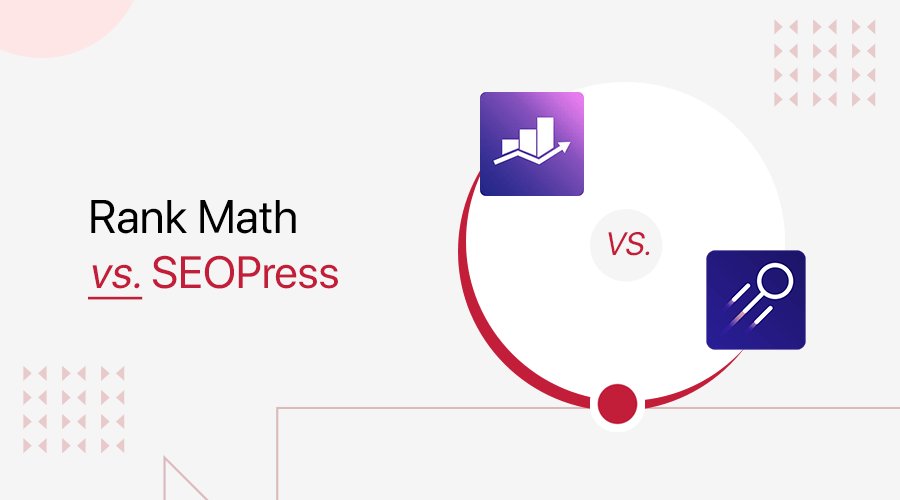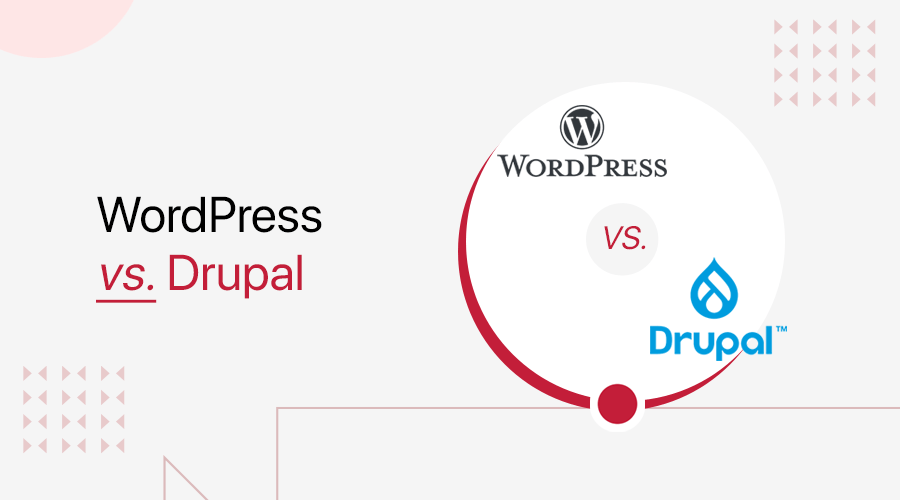
Do you want to compare WordPress vs Drupal? Or are you wondering which is better for your site? If yes, then you’re in the best place to know that!
Nowadays, having a robust online presence is vital for every business. So, you must have a fully functional website that connects you with the world. And to create and manage a website, you must choose the right website builder.
WordPress and Drupal are 2 popular site-building platforms with a plethora of features and customization options. Both of them are free and open-source software, but they’re different from one another. Likewise, the question remains: Which is better for your site?
Don’t worry! This blog shows a comparison between WordPress vs Drupal. Also, explore its unique features, usability, pros and cons, etc. By the end of this blog, you’ll have a clearer understanding of which software is best suited for you.
So, let’s start!
A. Introduction – WordPress vs Drupal
First and foremost, let’s have a quick introduction to WordPress and Drupal. Here we go!
What is WordPress? – Introduction
WordPress is the #1 leading Content Management System (CMS) platform. It dominates the web, with over 43% of all sites worldwide.
Further, this versatile platform lets you effortlessly create a variety of sites. It can be a blog, eCommerce site, portfolio, business website, etc. That too without requiring technical skills.
When setting up a WordPress website, you have 2 options to consider:
WordPress.org is a free and open-source platform that you can download from its website. Then, you’ve to install it on your web host. It provides a self-hosting solution, meaning you must arrange your hosting.
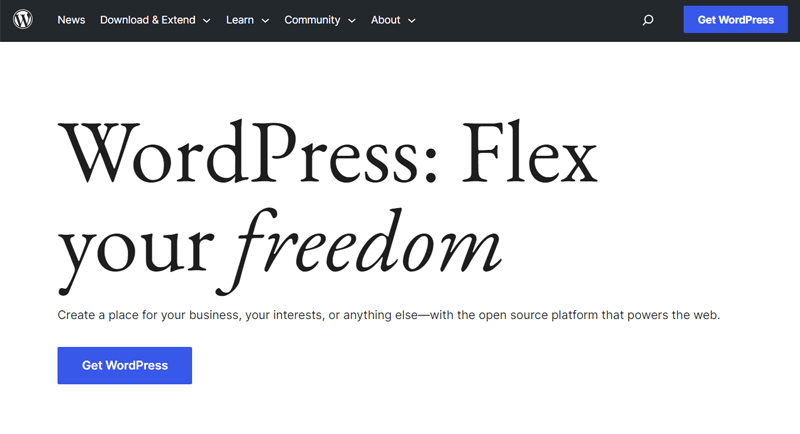
Whereas WordPress.com is a hosted site builder, allowing you to build your site without needing a separate host. Just sign up for an account and start website creation.
Do you want a deeper understanding of the difference between these 2 WordPress versions? Then, read our comprehensive blog post on WordPress.com vs WordPress.org.
Both WordPress versions have their strengths and weaknesses. However, WordPress.org gives you more flexibility in choosing hosting options tailored to your needs. That’s similar to what Drupal is all about. So, we’ll focus on examining Drupal vs WordPress.org here.
Before that, let’s take a brief overview of Drupal.
What is Drupal? – Introduction
Drupal is a free and open-source CMS and CMF (Content Management Framework) platform. Because it’s suitable for both website owners and developers.
In fact, it’s slightly older than WordPress. Originally, Drupal was a small news website with a web board. Now, it has evolved into one of the most popular website builders.
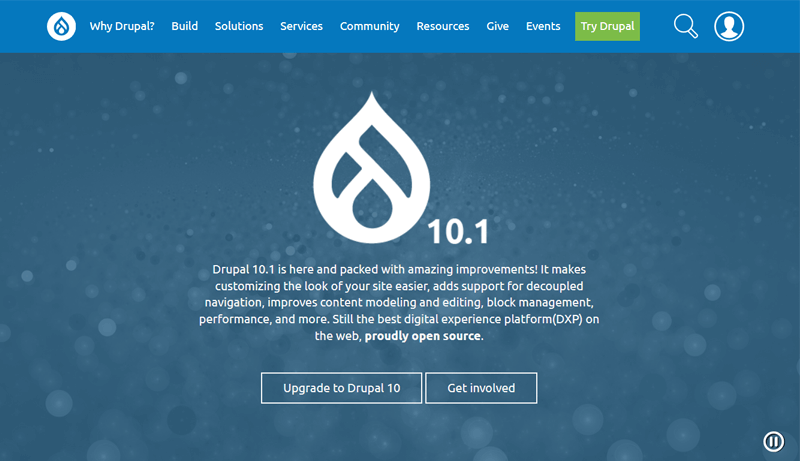
Moreover, it’s flexible and scalable. Meaning, you can create diverse sites and web applications tailored to your needs. It can range from small personal blogs to large enterprise sites. Best of all, it’s suitable for handling high-traffic sites.
In addition, you can integrate various modules and themes for seamless customization and functionality improvements. Not to mention, it also has an active community that offers regular updates, security patches, and support resources.
On top of that, Drupal has exceptional multilingual capabilities. So, many organizations prefer this host to serve content in multiple languages and reach a global audience.
Unlike WordPress.com, Drupal doesn’t provide a hosted solution. So, you must find a hosting service yourself. Further, you need to take care of the site’s security, performance, and overall management responsibilities.
With that, let’s start the comparison right away!
B. Key Features Comparison – WordPress vs Drupal
Here, you can check out the major features of WordPress and Drupal. To make it simpler, let’s compare them in a table to quickly find out the similarities and differences.
| Platforms / Features | WordPress | Drupal |
| Overview | A free and open-source CMS platform. | A free and open-source CMS (for beginners) and CMF (for developers). |
| Ease of Use | Easy to learn and use for beginners. But a newcomer may have a slight learning curve. | It has a steep learning curve. So, you may require technical expertise. |
| Target Users | Ideal for individuals and businesses who want small to medium-sized sites. | Suitable for enterprises that want complex and large websites. |
| Customization | Extensive library of themes and plugins. | Highly customizable with a flexible framework. |
| Security | Requires frequent updates and constant monitoring. | Involves security features that are actively monitored. |
| Support Options | Large community and extensive resources. | Active community and dedicated developers. |
| Update and Maintenance | Able to automate the core and plugin updates. | Requires manual update and maintenance. |
| Multilingual Capabilities | Requires plugins for building sites with multiple languages | Contains built-in multilingual capabilities. |
| Pricing Structure | The price depends on whether you use free or paid themes and plugins. Also, the cost varies based on your host. The starting cost of a shared hosting plan in DreamHost is $2.95/mo billed yearly. The starting cost of a managed hosting plan in Kinsta is $35/mo. | The price depends on the usage of free or premium themes and modules. Also, the cost varies based on your web hosting platform. The starting price of a shared hosting plan on Hostinger is $2.99/mo. The starting price of a managed hosting plan on Acquia is around $141. |
C. Ease of Use – WordPress vs Drupal
A crucial factor that determines your choice of website builders is usability. So, you must try these platforms before using them for the live website.
To help you out, let’s check if these platforms are easy to set up and use. Let’s go!
Is WordPress Easy to Set Up and Use?
Beginning with WordPress, learn how to set it up and use it below. With that, you’ll find its user-friendliness in the real world.
Step 1: Setting Up WordPress on the Web Host
First, you must purchase a domain name and a web hosting platform for your WordPress site. In fact, many domain registrars are present to get a domain. Moreover, you can select a web host that offers a domain registration service.
For instance, DreamHost is a WordPress hosting platform with a domain registration service. Here, you can buy a WordPress hosting plan of various kinds.

Suppose you pick the managed WordPress hosting plan, then WordPress is pre-downloaded and installed on the dashboard. Alternatively, the remaining hosting solutions let you download and install WordPress yourself.
If you’re confused, then why not check out how to choose the best web hosting provider?
Step 2: Using the WordPress Dashboard
Once your hosting dashboard is ready, log into your WordPress dashboard. This opens the Dashboard > Menu menu, where you can find a clean and simple interface. Exactly, you’ll find all the menus on the left side and the respective options on the right.
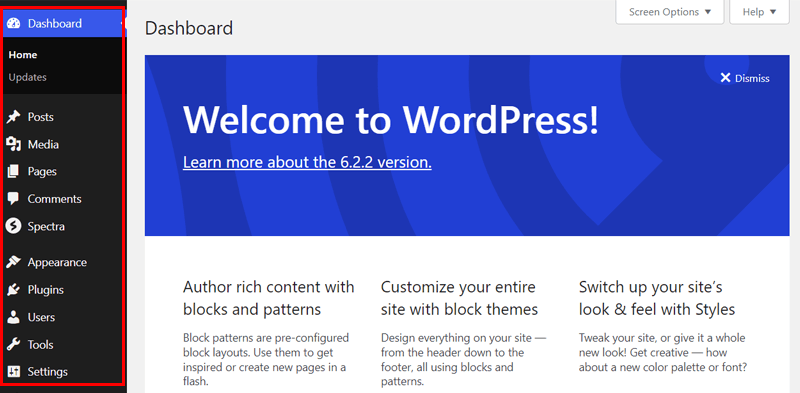
Now, let’s explore the WordPress dashboard menus to fact-check their ease of use:
- Dashboard: Here, you’ll see your website’s health status, recent activities, WordPress events/news, etc.
- Posts: You can create and manage your posts, categories, and tags in this option.
- Pages: This menu allows you to add and manage pages to your website.
- Media: It lets you insert, edit, and manage your website’s media files.
- Appearance: Here, you can pick a theme and edit or customize the web design.
- Plugins: This menu lets you install and manage WordPress plugins.
- Users: Open this menu if you want to add and manage the back-end users.
- Settings: Use this menu to set up site settings like media, privacy, permalinks, etc.
Is Drupal Easy to Set Up and Use?
Moving forward, let’s highlight the steps to configure and use Drupal. Ultimately, it helps you determine whether it’s easy to use or not.
Step 1: Setting Up Drupal on the Web Host
Initially, you must purchase a domain and web hosting plan for your Drupal website. You can grab a domain from any domain registration service. Or get it from a web host that includes the domain registration service.
For example, Hostinger is a popular web host that lets you launch Drupal sites. It not only gives domain registration, but you’ll also get a free domain on its higher plans.
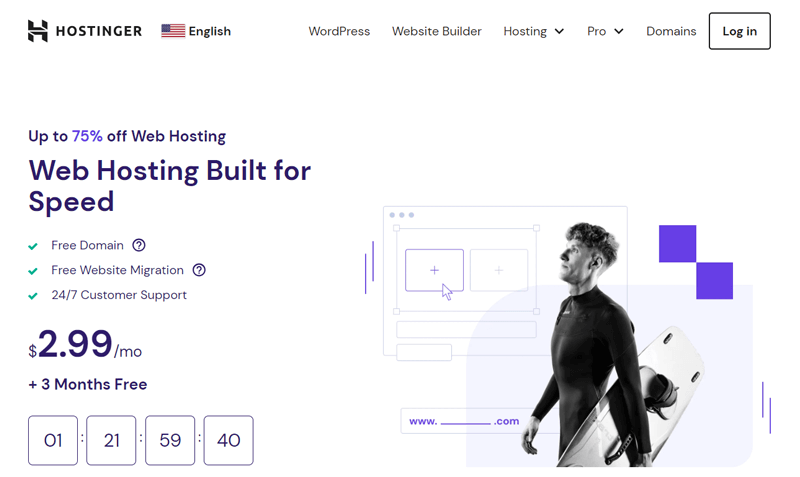
Exactly, it has a 1-click app installer, which is a custom-developed tool on its control panel. This lets you install 100+ apps with a click, including Drupal.
But Hostinger gives a shared hosting solution. Meaning, you must look after the hosting infrastructure.
So, you may prefer using a managed hosting provider that manages your hosting infrastructure. Or a Drupal-tuned host that includes ready-to-use Drupal software.
Learn about the detailed installation process of Drupal in this guide.
Another remarkable Drupal feature is Distributions. Installing a distribution will give you pre-configured packages of the core with additional themes, modules, and configurations.
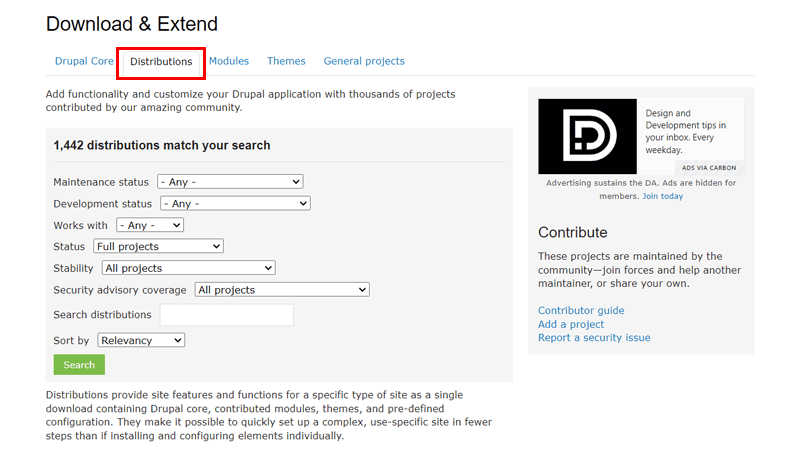
Best of all, different distributions are available to address specific industries and use cases. For example, you can use Commerce Kickstart to quickly create a store without any manual configuration.
Step 2: Using the Drupal Dashboard
Once your Drupal hosting environment is ready, you can open your website administration. There, you can find 2 menu sections at the top.
Below them, there’s a preview of your website. Currently, you’ll see the default content and design used for the website.
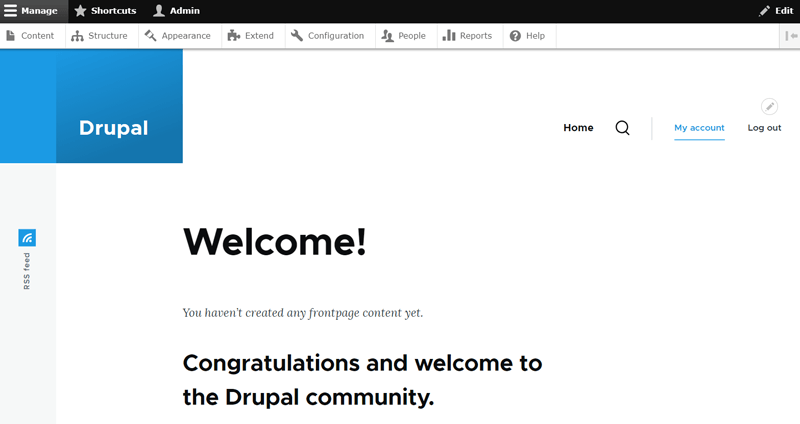
Now, let’s check out the menus one by one!
I. Top Menu
- Manage: This option lets you close and open the 2nd menu below the top menu.
- Shortcut: Here, you can edit the existing default shortcuts and use them.
- User: You can view and edit your profile. Also, you can log out of the dashboard.
- Edit: Using this tool, you can edit your website content.
II. Second Menu
- Content: Here, you can manage your content, blocks, comments, and files.
- Structure: Create, manage, and configure the structure of blocks, comments, contact forms, menus, etc.
- Appearance: Choose and configure the default or alternative themes for the site.
- Extend: Install or uninstall the modules of the core, experimental, migration, etc.
- Configuration: Set up the settings for people, system, interface, media, and more.
- People: Add new users and set their permissions, roles, and role settings.
- Reports: Check the status report, available updates, field list, plugin list, and more.
- Help: Get help on how to start and overview all the modules.
- Vertical Orientation: Changes the orientation of the horizontal 2nd top menu.
Winner? – WordPress
In summary, WordPress has a beginner-friendly interface with a rich user experience. Further, installing and using WordPress is quick and easy.
Undoubtedly, Drupal has a simple installation process. But the dashboard looks confusing and difficult to use. Hence, you must have prior knowledge and some technical skills.
Overall, WordPress is the ultimate winner of this round.
D. Theme Design and Customization – WordPress vs Drupal
Next up, we have a comparison between WordPress vs Drupal in terms of theme design and customization options.
It’s vital to check the themes and customization options in your chosen software. Because you want to have an attractive design and personalize it according to your needs. Isn’t it?
So, what are you waiting for?
WordPress Theme Designs and Customization Options
Currently, WordPress has over 11,000 free themes in the theme directory. Further, you can find extended premium options for many of the free themes on their respective websites.
Additionally, there are several more premium themes on marketplaces. For example, ThemeForest is a popular marketplace with a collection of paid themes for sale.
Undoubtedly, each theme has templates or features that suit one or more kinds of sites. All of the templates are responsive and compatible with major browsers for a smooth user experience.
Here’s a list of some popular WordPress themes of various kinds:
- Astra: The #1 popular multipurpose theme to use on several website niches.
- Fairy: A simple and clean blog theme ideal for various blog websites.
- OceanWP: Another multipurpose theme with numerous customization options.
- WooCommerce Storefront: A WooCommerce theme to build online store sites.
- Hello Elementor: An easy-to-use theme to enjoy the Elementor page builder.
Some other multipurpose themes are Zakra, Kadence, GeneratePress, etc. Hence, you can install any WordPress theme on your website. And then use any template available.
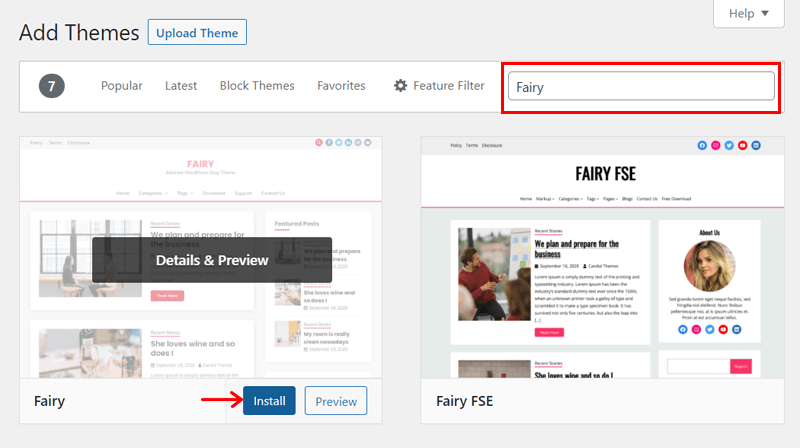
Best of all, you can alter the content and design however you like. Since WordPress has a powerful live customizer with unlimited customization options.
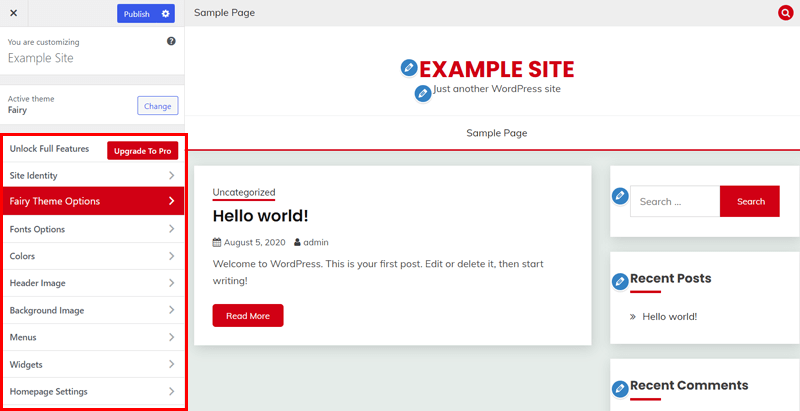
In fact, using a WordPress page builder plugin makes customizing your site super easy. You can drag and drop the design elements and customize each of them quickly.
Drupal Theme Designs and Customization Options
You can find over 3,000 Drupal themes on its Themes project page. Comparatively, Drupal has fewer themes than WordPress, but they are just as good.
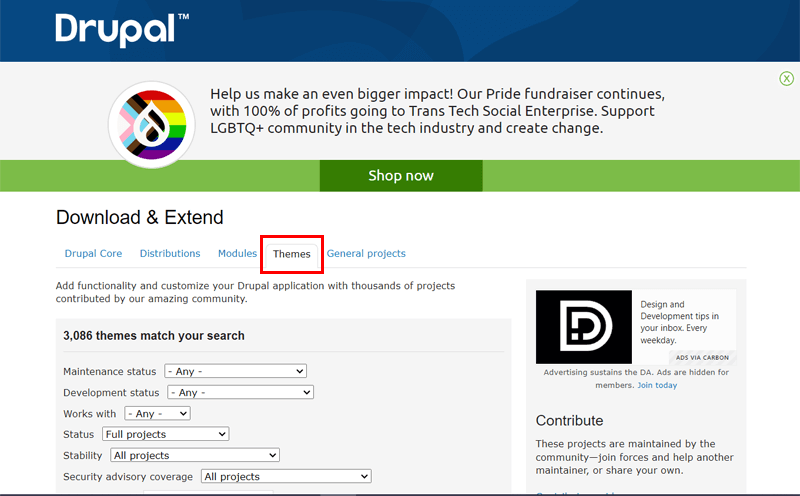
Generally, these themes are minimalist, allowing you to personalize them however you like. Indeed, they may not be as beginner-friendly as WordPress, but they can be more customizable.
Similar to WordPress, a theme can be suitable for one or more kinds of websites. Here’s a list of some popular themes available:
- Adminimal: A responsive administration theme with minimal design.
- Flexi Cart: Mobile-first theme for eCommerce sites with browser-friendly features.
- Freelancer Zymphonies: A multipurpose theme ideal for developers and freelancers.
- Pivot: Another multipurpose blog theme best for education, business, or portfolios.
The installation process of a Drupal theme is just like that of WordPress. You must download the file, open the dashboard, upload it, and activate it. However, you require more technical knowledge to use a Drupal theme if you want an attractive design.
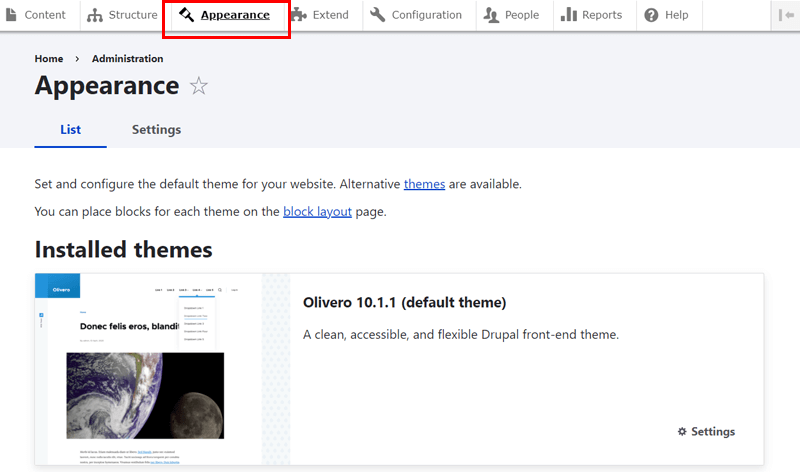
Learn about installing a Drupal theme in this guide.
Winner? – WordPress
WordPress definitely wins this round regarding themes and customization of websites. Not only the number of themes counts for this victory. But also how simply you can install and use a theme to personalize it the way you like. Finding a theme is also easier in WordPress.
In fact, Drupal lets you customize your website uniquely and is ideal for developers. But non-technical site owners may face difficulties. Hence, we crown WordPress as the winner.
E. Plugins or Modules – WordPress vs Drupal
Another comparison factor that determines which website builder is better is its plugins or modules. Basically, a plugin or module adds extra functionality to a website.
Simply put, WordPress comprises plugins, while Drupal consists of modules. So, let’s compare them concerning their plugins or modules. Shall we?
Exploring WordPress Plugins and Integration
Right now, WordPress has more than 60,000 free plugins in the plugin repository. Also, you can find extended paid options for many of the free plugins on their respective websites.
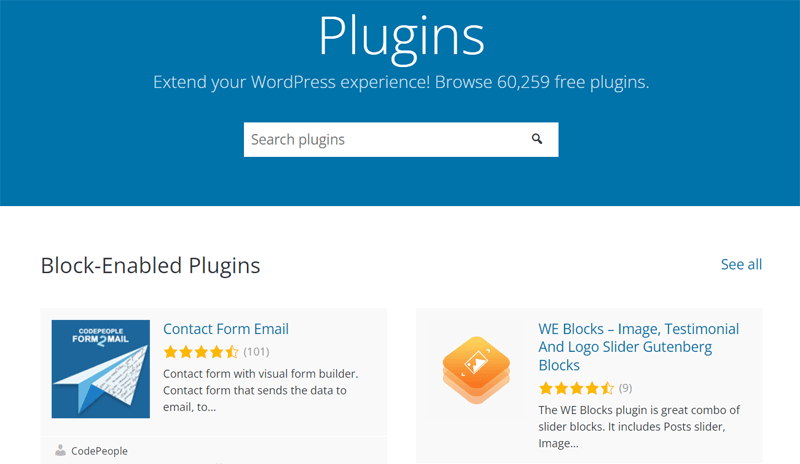
Further, there are numerous premium plugins on marketplaces. For example, CodeCanyon is a famous marketplace with a wide range of premium plugins for sale.
Generally, a WordPress plugin adds features to a website with a specific goal. And within a category, you may find tons of plugins competing against one another.
Here’s a list of some popular WordPress plugins in various categories:
- TutorLMS: An LMS (Learning Management System) plugin for online course sites.
- Rank Math: A SEO (Search Engine Optimization) plugin that ranks sites higher.
- Dokan: It lets you build a multi-vendor marketplace website to let vendors sell.
- Elementor: As said before, a page builder that makes editing your site simpler.
- ProductX: A Gutenberg block plugin with block designs for WooCommerce stores.
Hence, you can install all the necessary WordPress plugins on your website. Then, configure their settings to meet your needs.
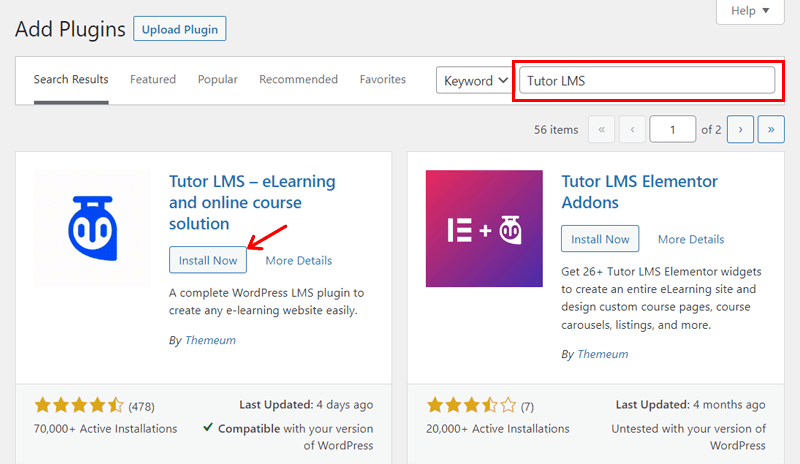
Further, many plugins also offer free and premium extensions. If you don’t find the feature you want, then integrate your WordPress site with 3rd-party applications.
In fact, WordPress supports many popular tools and services for this reason. Integrating a 3rd-party email marketing service on your website is a great example of that.
Exploring Drupal Modules and Integration
With full-on competition, Drupal is providing several free and premium modules. Currently, you can find over 50,000 modules on the Module project page.
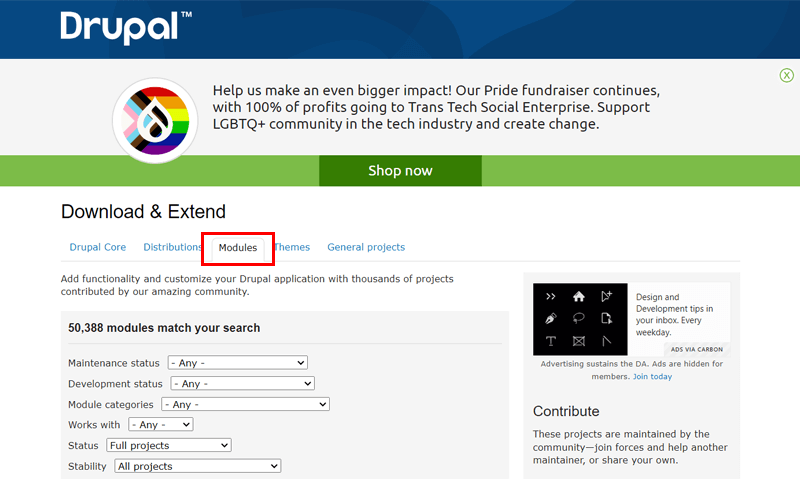
Unlike WordPress, using Drupal modules isn’t easy for newcomers. Don’t worry! Many features for starter websites are present in the core. So, you don’t have to rely on modules and 3rd-party tools for powerful functionalities.
However, you can go through this list of useful Drupal modules:
- Paragraphs: Enhances content editing and brings a drag-and-drop editor function.
- Webform: A form builder with input types, email handlers, multi-step forms, etc.
- Chaos Tool Suite: Gives APIs (Application Programming Interface) for developers.
- Admin Toolbar: Turns the default admin toolbar menu into a dropdown menu.
Moreover, if you want to learn more about these modules, then find them on the module project page. But to use a module, you can learn how to install a Drupal module here.
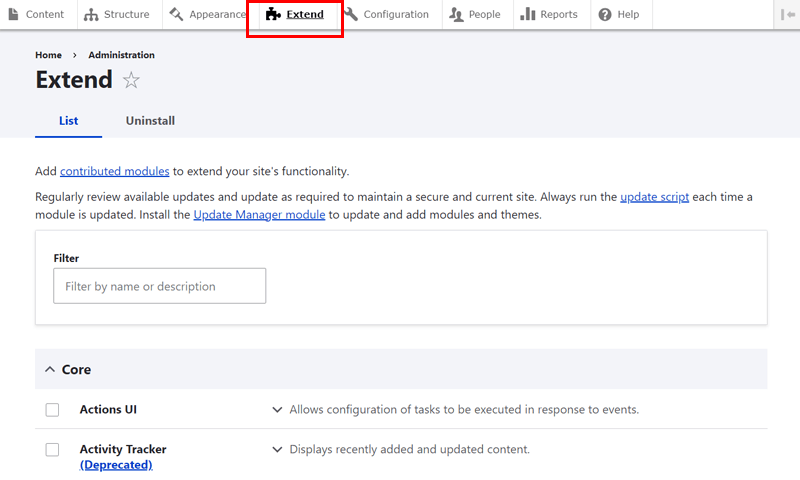
Winner? – WordPress
When comparing WordPress and Drupal, WordPress has more plugins. Moreover, installing and using the plugins is also simpler in WordPress.
Whereas Drupal may have a significant number of modules. But it’s quite complex to install and configure before using. So, these modules are ideal for enterprise-level or complex websites.
Hence, WordPress takes the cake over Drupal with easy-to-use plugins.
F. Security – WordPress vs Drupal
Once you configure your website using a theme and plugins, you must protect your and your users’ data online. To check how WordPress and Drupal secure a website, here’s a contrast between them.
So, let’s see what site security measures these builders offer. Get set, go!
How Secure is Your WordPress Site?
The WordPress core is secure and continuously monitored. For better security, you’ll also get core updates frequently.
But the plugins and the theme you use on your website may be insecure. So, you must carefully pick reliable tools and maintain the site’s security on your own.
Moreover, you can integrate one of the best security plugins for WordPress websites. These plugins are designed to offer security features.
For instance, Wordfence Security is a popular choice among site owners. It gives security options to protect your site against malware, cyberattacks, etc.

On top of that, your web hosting is also responsible for securing your website. So, please remember to utilize a secure and reliable WordPress hosting platform.
For example, Pressable is a renowned WordPress hosting company that’s filled with many security features. Notably, it uses WAF (Web Application Firewall) and provides the Jetpack Security Daily premium plugin on its plans.
How Secure is Your Drupal Site?
Drupal has a dedicated security team to continuously identify and mitigate potential threats. Plus, the software uses strong coding standards and strict community code review. So, it’s ideal for mission-critical sites and applications.
Moreover, you’ll find protective features like user access control, database encryption, mitigation of Denial of Service (DoS) attacks, etc. Indeed, Drupal has the most functionality within its core, reducing its reliance on 3rd-party modules.
However, you must be attentive to your site’s security. For that, you can find the best modules for security. Some of them are:
- Database SSL Check: Analyzes the details about your site and registered audience.
- Config Enforce: Make sure your website configuration can’t be altered.
- Drupal Path Guard: Ensures your users can’t access the content via an unsafe path.
Learn about the various Drupal security modules on this page.
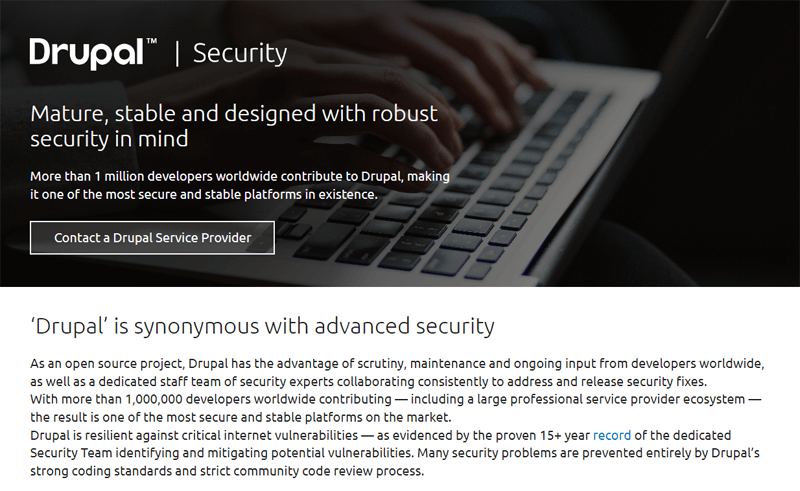
Winner? – Drupal
Drupal takes the lead in terms of security. Because Drupal developers actively contribute to making its core and modules stronger. And it’s also less reliant on 3rd-party modules.
On the other hand, WordPress websites rely on plugins for several functionalities. And there may be many plugins causing a security issue for your site. Although the WordPress community responds to such issues instantly, there remains a potential compromise.
G. Customer Support – WordPress vs Drupal
Customer support is crucial to resolving overwhelming situations for any website owner. Further, you may have various queries before or when using a platform for your business.
If you have any questions regarding WordPress or Drupal, then you may wonder how to get help. In this section, we’ll guide you through that.
Here, you’ll find all the customer support options for WordPress and Drupal. Also, this includes a comparison between these platforms to check which supports users better.
So, let’s dive right into it!
Available WordPress Support Channels
WordPress.org supports its users through various channels.
On its website, you’ll find the Learn WordPress page with tutorials, lesson plans, online workshops, and courses. If you want video tutorials, then visit WordPress.tv. Similarly, the Documentation page has technical, support, WordPress overview, and customization guides.
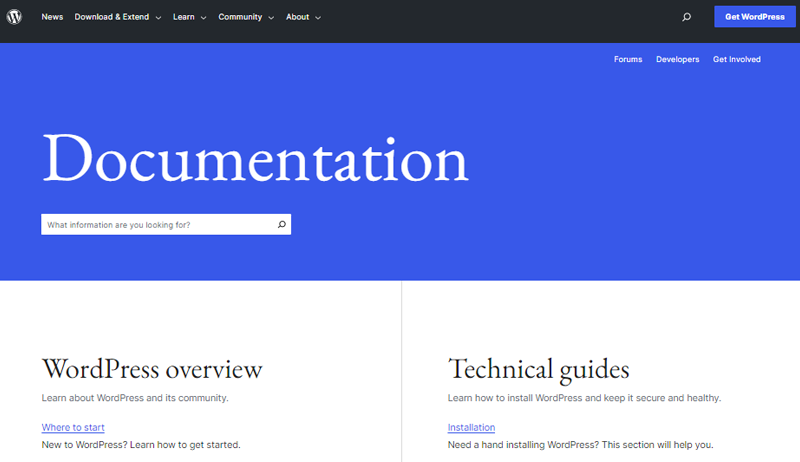
If you didn’t find the answer to your query, then open the Support Forum. It has links to the WordPress support forum. There, you can learn, share, and troubleshoot your problems. In addition, you can explore the Support Handbook for tips, tricks, and advice.
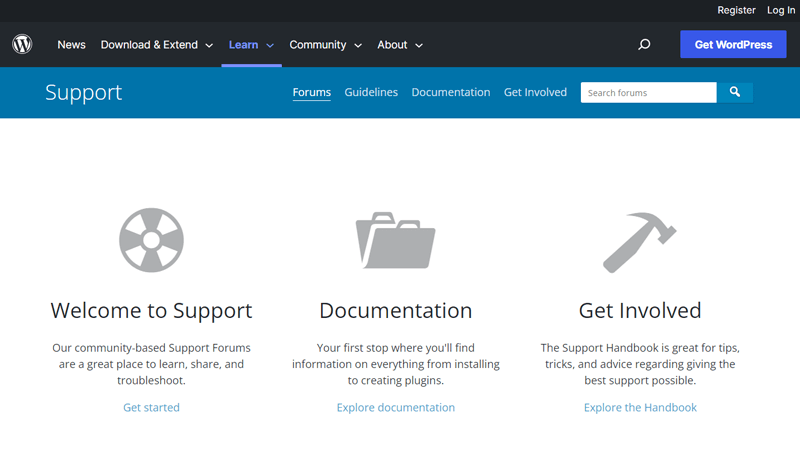
Furthermore, each WordPress plugin and theme has a separate support section. So, you can ask questions regarding the product there. For instance, if you’re confused about Rank Math, then comment on its support forum.
Best of all, each theme or plugin, or tool for WordPress gives support to its users on its official website. If you’re using a paid product, then you’ll receive more dedicated support.
On top of that, once you host your WordPress website on a hosting platform, you’ll get support from its team. The degree of support depends on your hosting solution.
Most of all, you can find numerous blogs, reviews, and tutorials about WordPress online. Since WordPress has many users and resources, you can connect with the experts for help.
Available Drupal Support Channels
On the Drupal website, you can find the ‘Resources’ menu. It includes various support options for its users. So, let’s find some crucial ones.
First, the Support page includes a list of possible support options. For instance, the User Guides page has an overview of many Drupal concepts. Some concepts include understanding Drupal, installation, site configuration, page management, etc.
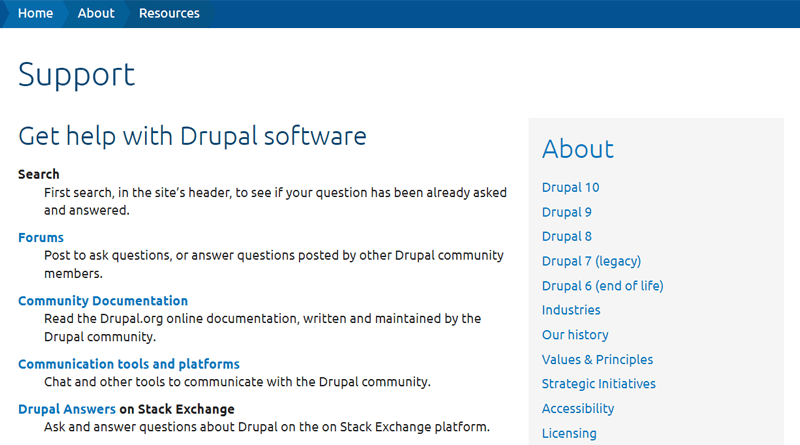
In addition, you’ll get access to additional guides on local development, all Drupal versions, etc. in its documentation. Also, you can visit the Developer docs if you’re a developer.
If you still haven’t found the answer to your query, then you can visit the Forums page. There, you can log into your account and post your confusion to get help from the community and experts.
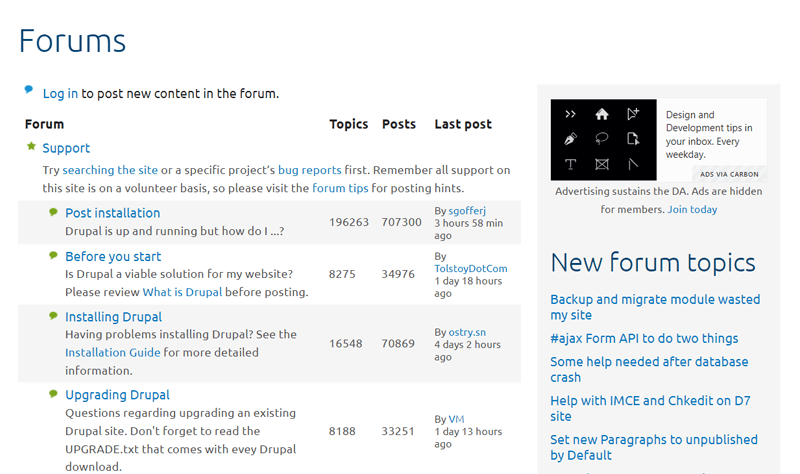
On top of that, you’ll get more support with your Drupal account. Such as ways to connect with the team and report issues or receive help.
As a self-hosting platform, your host will give you support on the technical configurations. Similar to WordPress, your support options vary based on your web host and plan.
Winner? – Tie
WordPress gives various free support options and resources. Some of them include video tutorials, support forums, documentation, etc. Also, you’ll receive dedicated support from the premium products and hosting platform.
On the other hand, Drupal involves free resources like guides, forums, and documentation. However, the Drupal community is not as large as WordPress to find resources online. Still, it does have active and engaging communities that offer assistance and share knowledge.
Because of the ample support options on both platforms, we give this round a tie.
H. Pricing Options – WordPress vs Drupal
Moving forward, you must be aware of the price of the website builder you’ll use. Because a suitable plan should not only contain all the vital features but also fit within your budget.
Hence, we’ll compare the available price options for both WordPress vs Drupal. With that, it can be easier to pick an ideal plan for any one of the platforms. Here we go!
WordPress Pricing Structures
WordPress.org is a free and open-source software for web development. You can find numerous free themes and plugins to kickstart your website.
However, the free features may not be enough for you. For exclusive features, you can purchase any premium theme or plugin available. Notably, the cost varies based on the product and plans you choose.
Most of all, WordPress.org is a self-hosting platform. So, you must search for and use a hosting platform yourself to run the website online.
Specifically, web hosting solutions can fall into 2 categories. They are:
- Affordable shared WordPress hosting solutions
- Carefree managed WordPress hosting solutions
Hence, if you want an affordable host, then we suggest using DreamHost or Bluehost. The price of both of their starter plans is $2.95 per month when billed yearly. When you choose a shared hosting plan, you’ve to manage your hosting infrastructure yourself.
On the other hand, the cost of a managed hosting provider is higher. But it manages the technical functions for you. Both DreamHost and Bluehost offer managed solutions as well.
But we suggest using Kinsta or WP Engine for high performance. The starting managed WordPress hosting prices for Kinsta and WP Engine are $35 per month and £16 per month respectively.
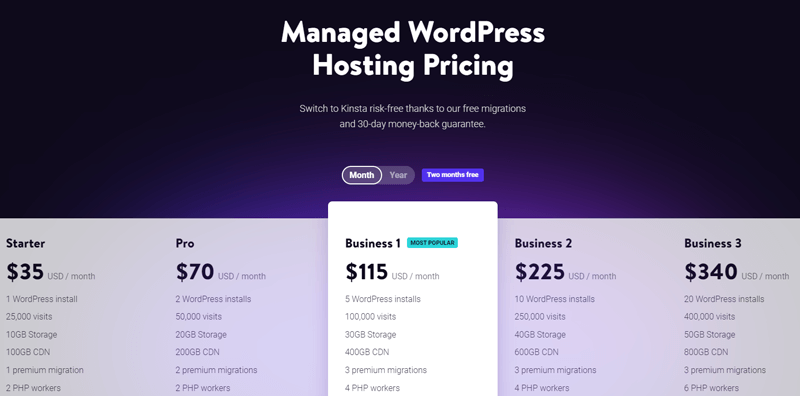
Explore more about these platforms in our Kinsta review and WP Engine review blogs.
Drupal Pricing Structures
As said before, Drupal is also a free platform. So, you can download, install, and use the software without payment. You may also find free modules and themes to use on the site.
But you must pay for the domain name and web hosting. Also, the costs increase when you insert a premium theme and paid modules.
Generally, premium themes are in the price range of $20 to $250. While premium modules are in the price range of $15 to $100. But what about web hosting?
To clear up your confusion, Drupal has a list of web host recommendations. You can find them here. Some notable providers are Scala Hosting, Hostinger, Pantheon, Acquia, etc.
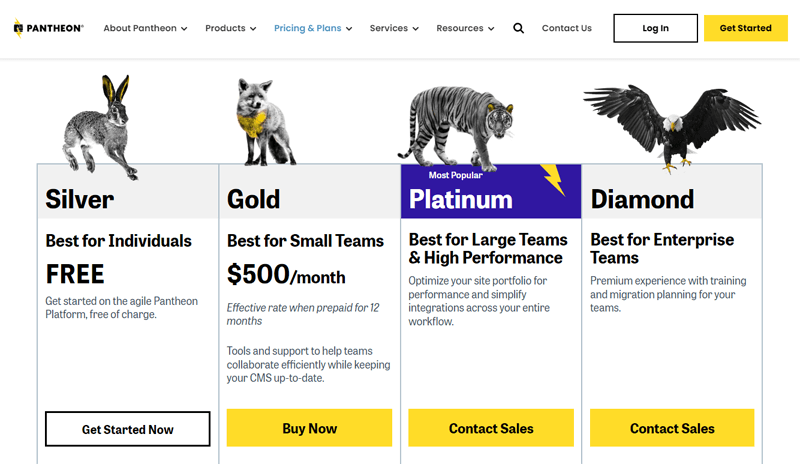
In fact, Drupal web hosting can also be of 2 types:
- Cheap shared hosting service
- Drupal-tuned hosting service
So, if you want a cheap solution, then go with Hostinger. The price for its web hosting plan is $2.99 per month with 3 months of free hosting. Here, you must take care of your plan yourself. Also, you must choose to install Drupal software from the control panel.
Whereas if you want an enterprise-level solution, then go with Acquia. It costs about $141. But you’ll get a fully-managed plan with automated features and various exclusive tools. In fact, these hosts are tuned to run Drupal websites.
Winner? – WordPress
The winning crown goes to WordPress. Because you can find many affordable web hosting providers for WordPress websites. And all of them support the website’s smooth running.
Notably, there are shared web hosts for Drupal as well. However, as Drupal focuses on high-performance websites, shared hosting may not be preferred. That’s why you may need a dedicated service, which will cost more money. That’s not suitable for beginners.
On top of that, WordPress has a relatively huge collection of free themes and plugins. Also, the price of hiring WordPress developers is lower than hiring Drupal developers.
I. Pros and Cons – WordPress vs Drupal
For the last comparison, here we provide you with the pros and cons of both platforms.
Pros and Cons of WordPress
Let’s start with the WordPress advantages and disadvantages:
Pros of WordPress
- WordPress is SEO-optimized. Further, you’ll find various WordPress SEO plugins to enhance the experience.
- Includes multiple customization options to personalize your website.
- Select any editor type you want to easily create a website comfortably.
- Contain several plugins and themes to have all the necessary features and designs.
- Offers many free resources to learn from and solve confusion.
Cons of WordPress
- With a tight budget, you must manage and maintain your hosting infrastructure.
- You have to focus on securing your site and data from vulnerabilities.
- Requires frequent updates of the WordPress core, plugins, themes, and tools.
- There can be a slight learning curve for inexperienced site owners.
Pros and Cons of Drupal
On the other hand, here are the pros and cons of Drupal:
Pros of Drupal
- Offers enterprise-level security for your websites.
- Includes free and premium modules, themes, and extensions.
- Ideal for large and complex websites like enterprises and high-traffic websites.
- Involves robust multilingual capabilities, suitable for multilingual websites.
- Contains extensive customization options, allowing developers to make tailored sites.
Cons of Drupal
- Contains a steep learning curve for beginners and non-technical users.
- Relatively, the cost of building Drupal websites is high.
- Comparatively, it has limited themes and modules than WordPress.
- Updates to modules may cause compatibility issues with 3rd-party services.
Now, it all boils down to one question. Which platform is better for your website? Is it WordPress or Drupal? Here’s what we’ve to say!
J. Recommendation – Which is Better for Your Site?
Between WordPress and Drupal, we recommend using WordPress. Because it meets the criteria of the majority of website owners or professionals.
However, the choice also depends on you! It differs based on numerous criteria. Most importantly, your business objectives, experience level, and budget.
So, choose WordPress:
- When you have little or no experience with website development.
- If you want to easily find various plugins and themes.
- In case your website’s primary focus is content creation.
- For quick deployment of small to medium-sized websites.
Alternatively, choose Drupal:
- If you want to launch a large or complex website.
- When security is a top priority for your business, organization, or enterprise.
- In case you’re a developer and want full flexibility and control over the site elements.
- For the creation of multilingual websites.
Hopefully, you have a clear business idea and have planned your business requirements. Only after that should you pick any of the 2 platforms that fulfill your needs. Good luck!
Conclusion
And there you’ve it! We’re at the last phase of our comparison between WordPress vs Drupal. Hopefully, it gave you valuable insights into their strengths and weaknesses, enabling you to make an informed decision for your website.
Overall, both of these open-source platforms are top-notch for beginners and experts. So, you can select the one that aligns more with your needs and requirements.
If you find yourself still grappling with any queries or uncertainties, then don’t hesitate to share them with us. We’re eagerly waiting to help you with your questions.
Moreover, please feel free to explore other blogs on our website. Read how to find out what website builder was used and WordPress vs Contentful.
Lastly, follow us on Facebook and Twitter to find similar articles like this.
